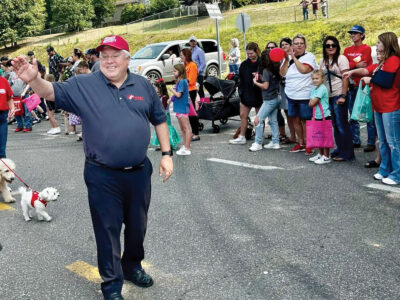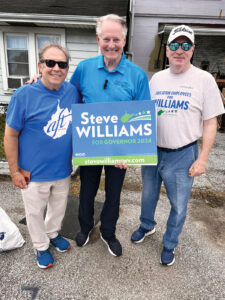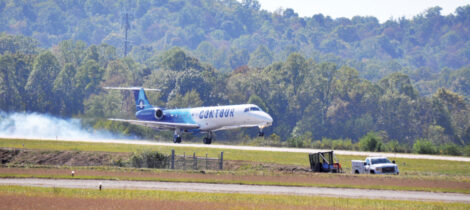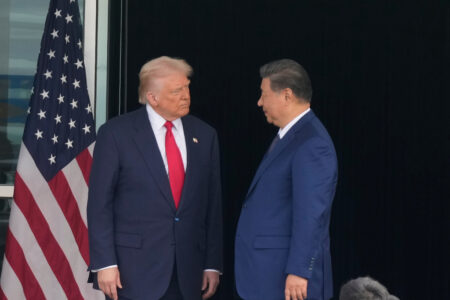Democratic, Libertarian candidates for W.Va. governor seek debate with Morrisey
- Republican Attorney General Patrick Morrisey marched in parade in Putnam County last weekend as he campaigns for governor. (Photo Provided)
- Democratic Huntington Mayor Steve Williams, center, campaigns for governor at the beginning of September with AFT-WV President Fred Albert, left, and West Virginia Education Association President Dale Lee, right. (Photo Provided)
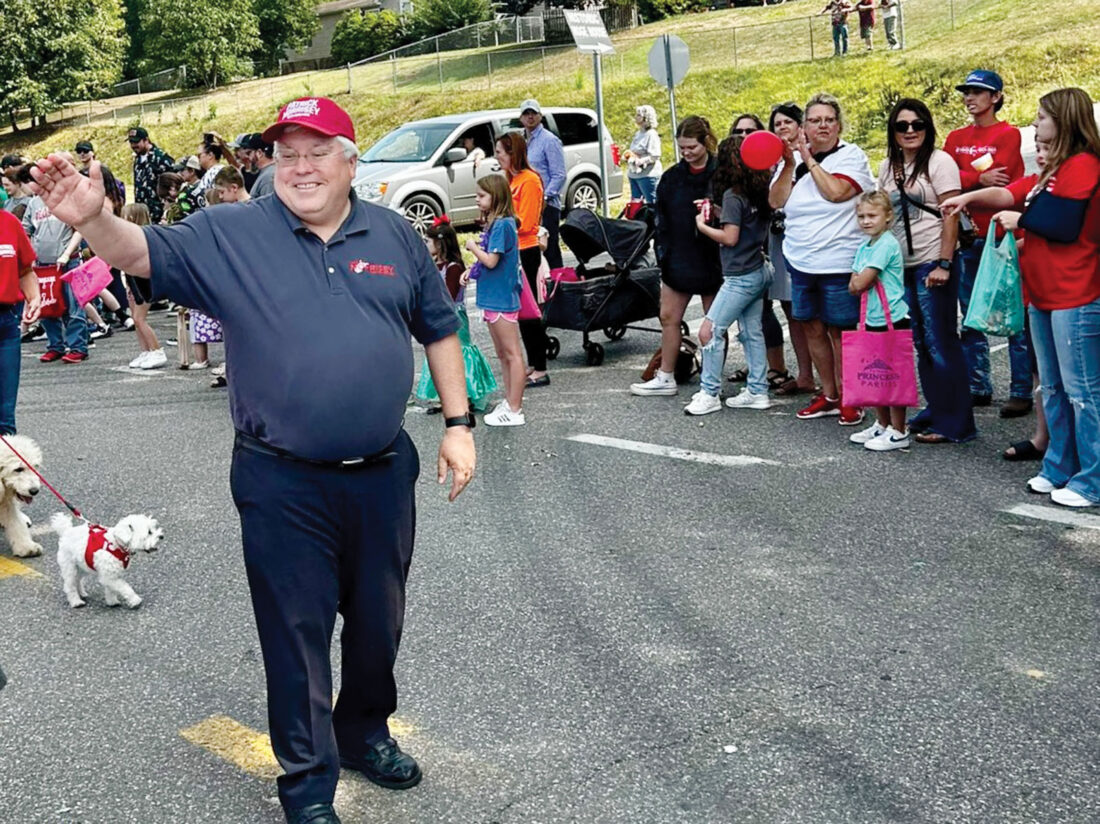
Republican Attorney General Patrick Morrisey marched in parade in Putnam County last weekend as he campaigns for governor. (Photo Provided)
CHARLESTON — Republican Attorney General Patrick Morrisey, the leading candidate for governor in both polling and fundraising, said Thursday he was willing to debate his Democratic opponent, Huntington Mayor Steve Williams.
Williams released a statement Thursday seeking a debate with Morrisey, who secured his GOP nomination for governor in a six-person race in May.
In his statement, Williams said a debate with Morrisey was critical for voters to hear directly from the candidates on key issues facing the state, including economic development, public safety, education, and the state’s substance use disorder crisis.
“West Virginians deserve a leader who isn’t afraid to answer tough questions,” Williams said.
Jonathan Ewing, the campaign manager for the Morrisey campaign, released a statement Thursday afternoon saying Morrisey was not opposed to a debate and taking a swipe at Williams, Democratic President Joe Biden, and Vice President Kamala Harris, the Democratic nominee for president in November.
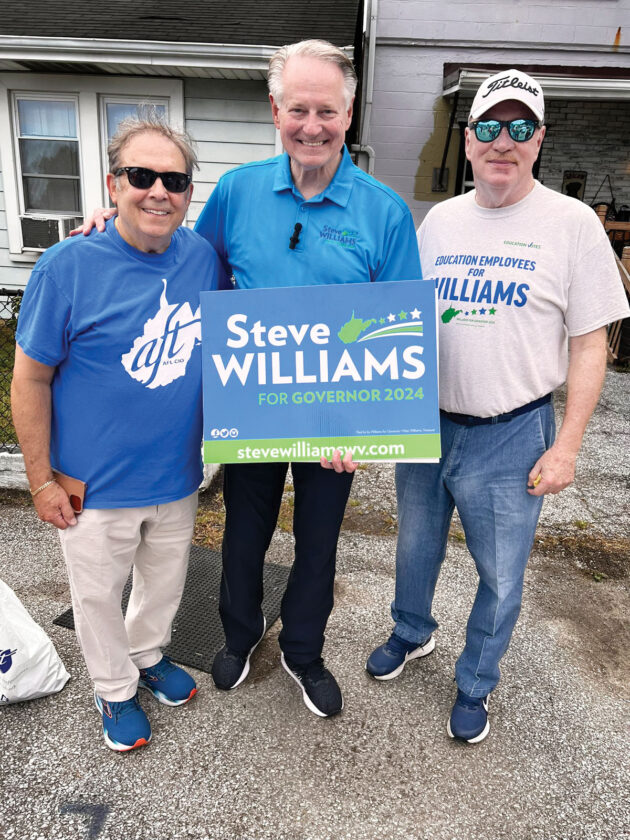
Democratic Huntington Mayor Steve Williams, center, campaigns for governor at the beginning of September with AFT-WV President Fred Albert, left, and West Virginia Education Association President Dale Lee, right. (Photo Provided)
“Patrick Morrisey has always made it clear he will debate and discuss his strong record of fighting for West Virginians,” Ewing said. “Our campaign looks forward to showing voters the clear contrast between Patrick’s bold vision for the Mountain State and a politician tied to the failed policies of Joe Biden and Kamala Harris.”
Williams, who was unopposed in his May Democratic primary, has yet to take the debate stage beside Morrisey. Most recently, the West Virginia Chamber of Commerce hosted both Morrisey and Williams for their Annual Meeting and Business Summit at the Greenbrier Resort in White Sulphur Springs in August. But instead of appearing together, both candidates spoke separately.
Williams is wrapping up his third term as the mayor of Huntington. According to the most recent WV MetroNews West Virginia Poll released at the end of August, 49% of respondents said they would vote for Morrisey, while 35% said they would vote for Williams, with 5% preferring another candidate and 11% unsure.
According to the West Virginia Poll, Morrisey had a 41% favorable rating with respondents despite an onslaught of negative attack ads by Morrisey’s GOP primary opponents, with 35% having an unfavorable view of the three-term Attorney General and 25% were not sure. Williams had the lowest name recognition of the political leaders included in the West Virginia Poll, with a 2 5% favorable rating, an 18% unfavorable rating, and 57% not sure.
Morrisey also ended the second quarter at the end of June with approximately $1.1 million in cash-on-hand after raising more than $5.3 million election year-to-date, while Williams ended the second quarter with more than $52,000 in cash-on-hand after raising more than $81,000 election year-to-date. Fundraising numbers for the third quarter ending Sept. 30 are not due until Monday, Oct. 7.
Also seeking a debate with Morrisey and Williams was Buckhannon attorney Erika Kolenich, the Libertarian Party candidate for governor. Kolenich is an attorney for the Klie Law Offices.
“It has been over a decade since the duopoly has permitted a third-party candidate to the gubernatorial debate,” Kolenich said in a press release Thursday. “If a candidate is qualified to be on the ballot for governor, they should be heard. Now is the time, West Virginia!”
Kolenich was the Libertarian Party candidate for governor in 2020, facing Republican Gov. Jim Justice in his re-election campaign, Democratic Kanawha County Commissioner Ben Salango, and Mountain Party candidate Daniel P. Lutz. While Kolenich came in third, she only received 22,527 votes according to the Secretary of State’s Office, or barely 3% of the votes cast. Justice won re-election with 497,944 votes, or nearly 65% of the vote.
According to her second quarter campaign finance report, Kolenich had nearly $15,000 in cash-on-hand as of the end of June, raising more than $16,000 election year-to-date.
The Libertarian Party and the Mountain Party represent the state’s only two minor parties approved for state elections. According to the most recent voter registration numbers for August, there were 10,812 voters registered with the Libertarian Party, or just short of 1% of the nearly 1.2 million registered voters in the state. That is a 3% increase from 10, 490 registered voters in August 2023 and 34% increase from 8,046 voters in August 2020.
“The Libertarian Party has been steadily growing in this state over the past five years as voter registrations continue to steadily increase,” said Taylor Richmond, chair of the Libertarian Party of West Virginia. “The people of West Virginia deserve to hear alternative viewpoints and to realize that there is more than one way to get things done. Hearing more qualified voices is always the better option when deciding for whom to vote.”
Other candidates for governor include Mountain Party candidate Chase Linko-Looper and Constitution Party candidate S. Marshall Wilson, a former Republican member of the House of Delegates who switched to unaffiliated and challenged Justice in the 2020 race for governor as a write-in candidate. Wilson only received 15,120 votes, or just short of 2% of the vote that year.

